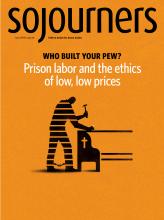IN 2015, Pope Francis told inmates at Philadelphia’s Curran-Fromhold Correctional Facility that the purpose of prison is rehabilitation, “to give you a hand in getting back on the right road, to give you a hand to help you rejoin society.” The pontiff said these words in front of a throne-like walnut chair made for him by prisoners participating in Philacor, a program that, according to news coverage about the pope’s visit, offers job training in carpentry, catering, printing, and textiles to those behind bars.
Read the Full Article

Already a subscriber? Login
